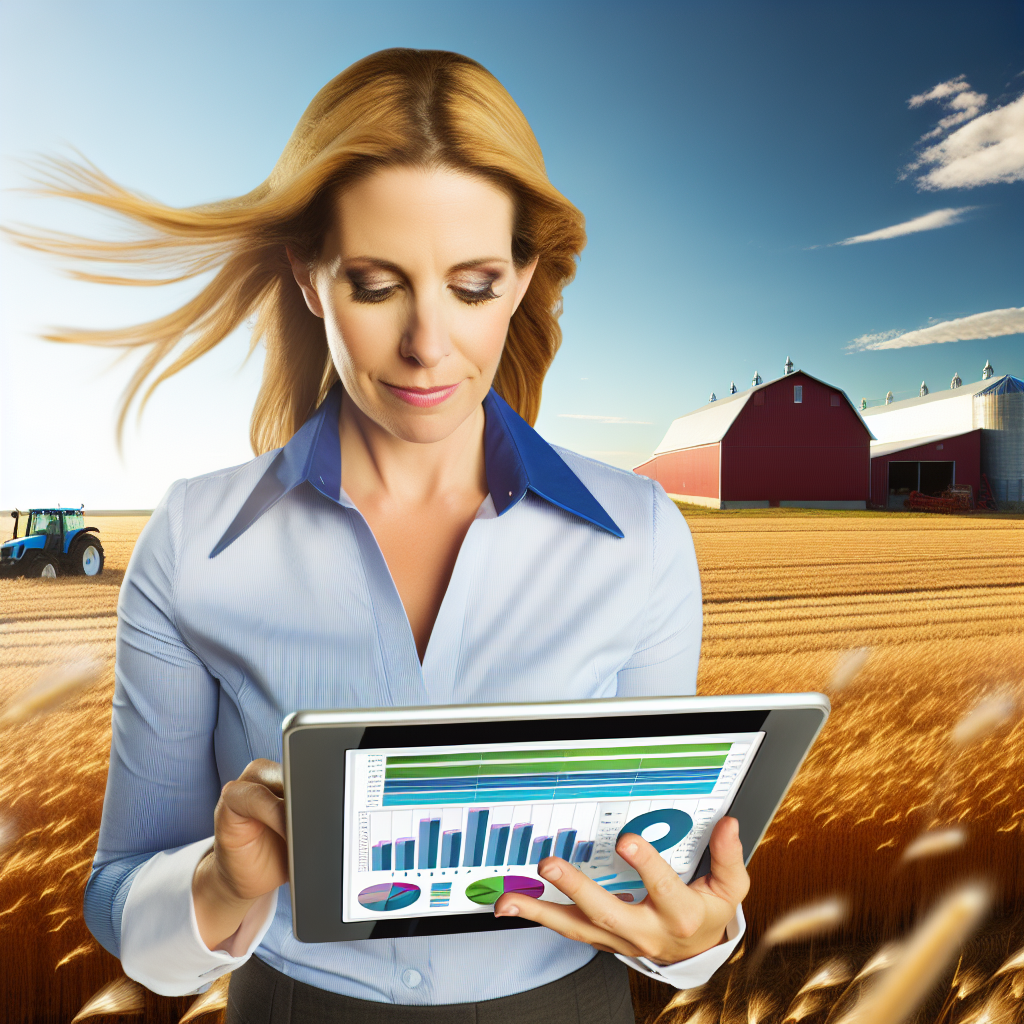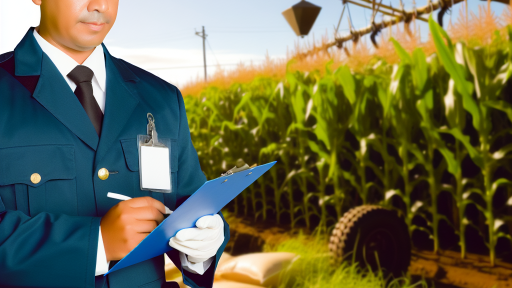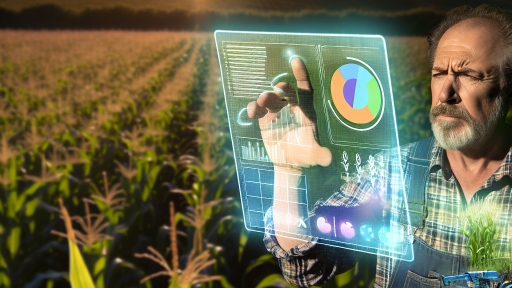Introduction to Blockchain Technology in Agribusiness
Blockchain technology revolutionizes the way agribusiness transactions occur.
This technology enhances transparency and security across the supply chain.
It allows all stakeholders to access a single version of the truth.
Farmers, suppliers, and retailers can trace products from origin to shelf.
Understanding Blockchain Fundamentals
Blockchain is a decentralized ledger technology.
It records transactions across many computers in a secure manner.
Once data is recorded, it cannot be altered without consensus.
This builds trust among parties involved in agribusiness transactions.
Benefits of Using Blockchain in Agribusiness
One significant benefit is improved traceability.
Consumers can verify the origin and quality of their food products.
Additionally, it reduces fraud and enhances food safety.
Moreover, blockchain enables faster processing of transactions.
Real-World Applications of Blockchain
Many agribusinesses use blockchain to streamline operations.
For example, farmers can track crop performance in real-time.
Similarly, retailers can manage inventories more efficiently.
Transform Your Agribusiness
Unlock your farm's potential with expert advice tailored to your needs. Get actionable steps that drive real results.
Get StartedCompanies like AgriDigital leverage this technology to improve logistics.
Challenges in Implementing Blockchain
Despite its advantages, blockchain adoption faces hurdles.
One challenge is the need for education among stakeholders.
Moreover, investment in technology infrastructure is necessary.
Data privacy and security concerns also arise with blockchain use.
Understanding the Need for Transparency in Agricultural Transactions
The Importance of Transparency
Transparency is essential in agricultural transactions.
It builds trust between farmers and consumers.
Furthermore, it reduces the risk of fraud.
Trust leads to stronger relationships and business growth.
Challenges in Current Practices
Many agricultural transactions lack clear visibility.
Farmers often face issues with payment delays.
Additionally, traceability of products is often complex.
This complexity can lead to disputes and misunderstandings.
The Role of Technology
Technology can mitigate many of these challenges.
Blockchain offers a promising solution for transparency.
This digital ledger records every transaction securely.
As a result, all parties can verify transaction details easily.
Benefits of Blockchain in Agribusiness
- Enhances accountability among stakeholders.
- Enables real-time tracking of products from farm to table.
- Boosts consumer confidence in the quality of products.
- Facilitates quicker dispute resolution when issues arise.
Examples of Successful Implementation
Several companies have successfully integrated blockchain.
Farmchain is one such example, focused on traceability.
Another example is AgriLedger, which streamlines transactions.
These platforms highlight the practical benefits of transparency.
Benefits of Implementing Blockchain for Supply Chain Management
Enhanced Transparency
Blockchain improves transparency throughout the supply chain.
Every transaction is recorded on a public ledger.
This visibility builds trust among all stakeholders.
Showcase Your Farming Business
Publish your professional farming services profile on our blog for a one-time fee of $200 and reach a dedicated audience of farmers and agribusiness owners.
Publish Your ProfileConsumers can trace products back to their origins.
For instance, farmers can showcase their practices.
Improved Efficiency
Blockchain automates many supply chain processes.
This automation reduces the need for intermediaries.
As a result, companies can lower their operational costs.
Real-time data sharing speeds up decision-making.
Transactions can be completed much faster than before.
Enhanced Traceability
Blockchain provides end-to-end traceability.
Each step in the supply chain is logged permanently.
Stakeholders can quickly identify and fix issues.
This capability is crucial during product recalls.
Traceability also helps in verifying organic claims.
Increased Security
Blockchain technology offers robust security features.
Data is encrypted and stored on a decentralized network.
This setup minimizes the risk of hacking and fraud.
Only authorized parties can access sensitive information.
Thus, businesses can protect their trade secrets.
Cost Reduction
Implementing blockchain can lower costs significantly.
By eliminating middlemen, companies save on fees.
Transparency also reduces fraud-related costs.
Over time, these savings can substantially boost profits.
Overall, blockchain promotes a leaner supply chain model.
You Might Also Like: Strengthening Farms With Strategic Business Alliances
How Blockchain Ensures Traceability of Agricultural Products
Overview of Blockchain Technology in Agriculture
Blockchain technology provides a decentralized ledger system.
This system records every transaction transparently.
As a result, it fosters trust among participants in the supply chain.
Farmers, suppliers, and consumers can trace products seamlessly.
Benefits of Traceability
Traceability enhances food safety significantly.
It allows for quick identification of contaminated products.
Consequently, recalls become more efficient and targeted.
Moreover, consumers appreciate transparency in sourcing.
How It Works in Practice
Each agricultural product receives a unique digital ID.
This ID travels with the product through the supply chain.
Stakeholders can access information about the product’s journey.
For instance, they can check where and how the product was grown.
Examples of Successful Implementations
Several farms worldwide have adopted blockchain solutions.
Agricultural companies like AgriDigital use this technology effectively.
They track grain shipments from farm to table.
Challenges and Solutions in Adoption
Despite its benefits, adopting blockchain presents challenges.
Technical knowledge requirements can be a barrier.
Showcase Your Farming Business
Publish your professional farming services profile on our blog for a one-time fee of $200 and reach a dedicated audience of farmers and agribusiness owners.
Publish Your ProfileTraining programs help stakeholders understand the technology.
Additionally, creating standards for data sharing is crucial.
Future Prospects of Blockchain in Agriculture
Growth in consumer demand for transparency drives innovation.
As blockchain technology matures, its applications will expand.
Integration with IoT devices could further enhance traceability.
Ultimately, blockchain will lead to a more sustainable agribusiness sector.
Uncover the Details: Succession Planning for Small and Medium Farms
Case Studies of Successful Blockchain Implementation in Farming
Introduction to Blockchain in Agriculture
The agricultural sector embraces blockchain technology for various reasons.
It enhances transparency and traceability across supply chains.
Moreover, it reduces fraud and errors in transactions.
To illustrate its effectiveness, we present several case studies.
Case Study: Farmerconnect and Coffee Supply Chain
Farmerconnect is revolutionizing the coffee industry with blockchain.
They enable consumers to trace coffee from bean to cup.
This builds trust between farmers and consumers.
Additionally, it ensures farmers receive fair compensation.
Through their platform, consumers access detailed information about their coffee.
This transparency enriches the overall purchasing experience.
Case Study: IBM Food Trust and Walmart
IBM Food Trust partnered with Walmart to improve food safety.
The collaboration uses blockchain for tracking fresh produce.
Walmart can trace the origin of products in seconds.
This rapid traceability minimizes potential health risks.
Consequently, it enhances consumer confidence in food safety.
Furthermore, the initiative improves supply chain efficiency.
Case Study: AgriDigital and Grain Supply Chain
AgriDigital has transformed grain trading through blockchain technology.
This system automates grain transactions and payments.
Farmers and buyers benefit from increased efficiency and reduced risk.
Through this platform, parties can securely exchange ownership records.
As a result, disputes related to transactions decline significantly.
AgriDigital’s platform fosters a trusted environment for trading.
Case Study: Provenance and Sustainable Seafood
Provenance uses blockchain to enhance transparency in the seafood industry.
They ensure sustainable sourcing by providing detailed product histories.
Consumers can verify the origins of their seafood purchases.
This initiative promotes responsible consumption practices.
Moreover, Provenance empowers consumers to make informed decisions.
This shift benefits both the environment and ethical fishing practices.
Lessons Learned from Blockchain Implementation
Several key lessons emerge from these case studies.
First, collaboration between stakeholders enhances trust.
Second, technology adoption requires user-friendly interfaces.
Additionally, education about blockchain benefits is crucial.
Finally, transparent communication fosters industry-wide acceptance.
Showcase Your Farming Business
Publish your professional farming services profile on our blog for a one-time fee of $200 and reach a dedicated audience of farmers and agribusiness owners.
Publish Your ProfileSee Related Content: Leveraging SEO for Agribusiness Marketing

Challenges and Limitations of Adopting Blockchain in Agribusiness
Understanding High Implementation Costs
Implementing blockchain technology can be expensive for agribusinesses.
Initial setup costs often deter smaller farms from adoption.
Additionally, ongoing maintenance adds to long-term expenses.
Some farms may struggle to justify these costs against potential benefits.
Complexity of Technology
Blockchain technology involves complex technical systems.
Many farm employees may lack the necessary skills to operate it.
Training programs require time and resources, creating further challenges.
Thus, the complexity of blockchain can slow down its acceptance.
Data Privacy Concerns
Data security and privacy issues complicate blockchain implementation.
Farmers often worry about sensitive information being exposed.
Additionally, regulations around data have varying interpretations globally.
These concerns can impede the willingness to adopt blockchain solutions.
Interoperability with Existing Systems
Many agribusinesses rely on established systems to manage operations.
Integrating blockchain with legacy systems poses significant challenges.
This can lead to increased operational disruptions and inefficiencies.
Moreover, achieving seamless interoperability remains a technical hurdle.
Regulatory and Legal Challenges
Legal frameworks around blockchain technology are still developing.
Unclear regulations can create hesitance among farming businesses.
Farmers need assurance that their blockchain use complies with laws.
Moreover, international transactions may face additional regulatory scrutiny.
Scalability Issues
Many blockchain solutions struggle with scalability as transaction volume increases.
As more participants join, the system can become congested and slow.
This scalability issue can affect the efficiency of agribusiness operations.
Consequently, businesses must consider whether blockchain can support their growth.
Resistance to Change
Many farmers are traditionally rooted in established processes.
Resistance to change can impact the adoption of innovative technologies.
Additionally, a lack of awareness about blockchain’s benefits exists.
Education efforts are vital for encouraging acceptance in agribusiness.
Uncover the Details: Cooperative Strategies For Agribusiness Success Today
The Role of Smart Contracts in Automating Transactions
Introduction to Smart Contracts
Smart contracts are self-executing contracts with the terms directly written in code.
They operate on blockchain networks, offering a decentralized and secure environment.
These contracts reduce the need for intermediaries, streamlining the transaction process.
Benefits of Automating Transactions
Automation through smart contracts enhances efficiency in agribusiness transactions.
It minimizes the risk of human error and delays associated with manual processing.
Additionally, automated transactions can occur 24/7, improving availability for farmers and buyers.
Enhancing Transparency and Trust
Smart contracts ensure transparency by recording all transaction details on the blockchain.
Each party involved in the transaction can access the same information in real time.
This openness fosters trust between buyers and sellers, critical in agribusiness.
Use Cases in Agribusiness
Smart contracts can facilitate various transactions in the agribusiness sector.
Showcase Your Farming Business
Publish your professional farming services profile on our blog for a one-time fee of $200 and reach a dedicated audience of farmers and agribusiness owners.
Publish Your ProfileFor instance, they streamline payments for crop purchases between farmers and suppliers.
They can also automate insurance claims, ensuring prompt payouts during adverse events.
Future of Transactions with Smart Contracts
The adoption of smart contracts will likely grow in the agribusiness sector.
As technology advances, more use cases will emerge, enhancing productivity.
Governments and organizations must support this innovation to drive adoption.
Future Trends: How Blockchain Can Reshape Global Agriculture
Improving Supply Chain Transparency
Blockchain enhances transparency across the agricultural supply chain.
It allows stakeholders to track products from farm to consumer.
Through real-time data access, consumers can verify product origins.
Furthermore, farmers can ensure fair pricing by demonstrating product quality.
Streamlining Transactions
Blockchain technology simplifies transaction processes within agriculture.
Smart contracts automate agreements between producers and buyers.
This automation minimizes delays and errors in transaction handling.
As a result, agricultural businesses can operate more efficiently.
Enhancing Food Safety
Food safety is critical in global agriculture.
Blockchain provides detailed tracking of food products.
This allows for swift responses to food safety issues.
Increased traceability reduces the risk of contaminated products reaching consumers.
Empowering Smallholder Farmers
Blockchain can significantly benefit smallholder farmers worldwide.
By providing access to fair markets, it eliminates intermediaries.
These farmers can receive direct payments, improving their income stability.
Additionally, blockchain platforms can connect them with global buyers.
Facilitating Sustainable Practices
Implementing blockchain encourages sustainable agricultural practices.
Records of sustainable practices can be maintained transparently.
Consumers increasingly prefer products sourced from sustainable methods.
As such, blockchain helps increase the visibility of eco-friendly options.
Future Developments in Blockchain Technology
The future of blockchain in agriculture looks promising.
Researchers are developing innovative applications to enhance efficiency.
Improvements may include better data analytics and machine learning integration.
Ultimately, these advancements could lead to smarter farming techniques.
Additional Resources
Blockchain Technology for Agriculture: Applications and … – Frontiers
Blockchain technology for agricultural supply chains during the …




